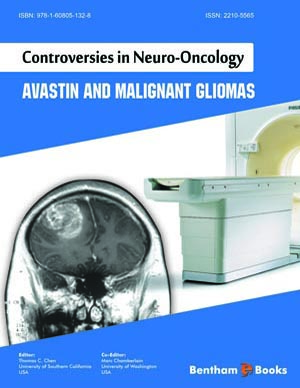Abstract
Background: Angiogenesis is a common theme in cancer and accordingly, antiangiogenic therapies are increasingly utilized for the treatment of cancer including cancers of the central nervous system (CNS). At present, proof of principle of antiangiogenic therapy for CNS tumors has only been realized for recurrent glioblastoma (GBM). Methods: A literature review of the use of bevacizumab and other antiangiogenic therapies in neuro-oncology apart from the treatment of recurrent GBM. Results: Several potential applications for antiangiogenic therapy are suggested by the limited literature presently available including; recurrent anaplastic gliomas, elderly newly diagnosed GBM, unresectable high-grade gliomas with significant mass effect requiring high dose steroid (up-front therapy), radiation necrosis with mass effect, pseudoprogression requiring surgical intervention, highly angiogenic non-glioma primary brain tumors (i.e. vestibular schwannomas, meningioma, hemangiopericytoma, hemangioblastoma), brain metastases in bevacizumab responsive cancers (i.e. renal cell, ovarian, breast and non-small cell lung cancers), up-front treatment of newly diagnosed GBM, radiation optic neuropathy and treatment of selected intracranial sarcomas. Conclusions: Bevacizumab and other angiogenic inhibitory therapies appear to have the potential to treat a variety of brain tumors and brain tumor treatmentrelated conditions such as pseudoprogression and radiation necrosis. To date; however, these novel applications of angiogenesis inhibitors remain conjectural given that majority of data is retrospective or exploratory.






















